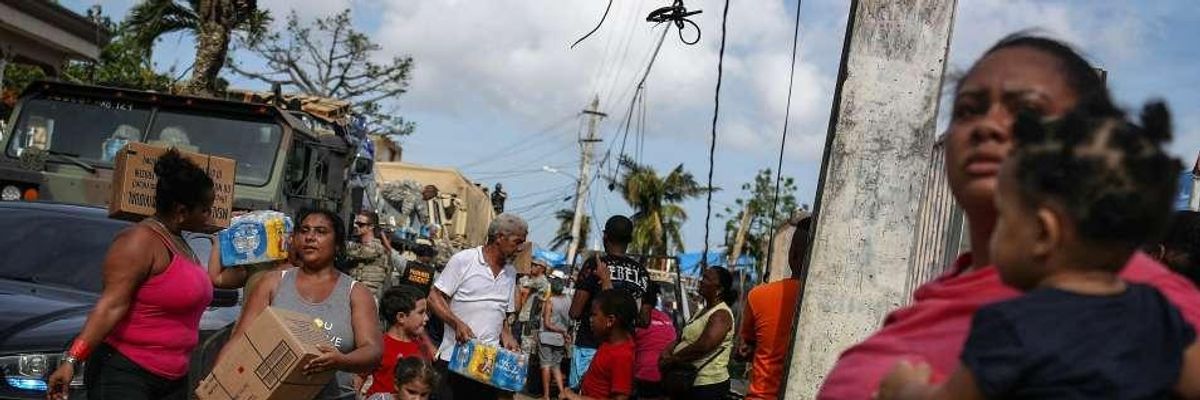A new study about the record-breaking rain that Hurricane Maria dropped on Puerto Rico in 2017 offers more evidence that the climate crisis is making extreme weather events more common and destructive.
"What we found was that Maria's magnitude of peak precipitation is much more likely in the climate of 2017 when it happened versus the beginning of the record."
--David Keellings, lead author
The report, recently published in the American Geophysical Union's journal Geophysical Research Letters, focuses on data from the 129 major storms that impacted the U.S. territory between 1956 and 2016.
"What we found was that Maria's magnitude of peak precipitation is much more likely in the climate of 2017 when it happened versus the beginning of the record," lead author David Keellings, a geographer at the University of Alabama, said in a statement Tuesday.
Specifically, a storm like Maria--which caused unprecedented flooding and landslides that severely damaged the island's electrical, water, and communications infrastructure--was nearly five times more likely two years ago than it was in the middle of the last century, according to the study. Maria produced more rain than any other regional storm in the six decades studied.
Previous research tied Hurricane Harvey's intense rains--which hit the Houston area in 2017--to human-caused global warming, but this study was the first to examine rainfall in Puerto Rico. Those findings build on scientists' broader warnings in recent years about the future of extreme weather.
As Keellings put it, "Due to anthropogenic climate change it is now much more likely that we get these hurricanes that drop huge amounts of precipitation."
"Some things that are changing over the long-term are associated with climate change--like the atmosphere getting warmer, sea surface temperatures increasing, and more moisture being available in the atmosphere," he explained. "Together they make something like Maria more likely in terms of its magnitude of precipitation."
That is particularly bad news for Puerto Rico, which is just a few months away from the 2019 hurricane season--still struggling to rebuild nearly two years after Maria caused an estimated $92 billion in damage and, according to one study from Harvard researchers, killed up to 6,000 Americans.
Since Maria made landfall in September of 2017, both the Trump administration and Republicans in Congress have refused to provide adequate relief to the island--which many Democratic lawmakers, activists, and island residents argue clearly shows that Puerto Ricans are treated as "second-class citizens."
In late March, Common Dreams reported, "the president inflated the amount of aid Puerto Rico has received since Hurricane Maria and pushed lawmakers to limit funding to the island." While Trump was widely condemned for his "vindictive behavior," the public pressure hasn't been enough to push members of Congress to provide more disaster relief funding.
"Congress should have already passed a desperately-needed disaster aid package instead of delaying action. Nutritional assistance and resiliency support are a matter of life and death."
--Erica Gonzalez, Power 4 Puerto Rico
Just days after Trump's remarks, a GOP emergency aid bill stalled in the U.S. Senate because a key number of Democrats believed it didn't go far enough to help the island. Instead, Democrats backed a House-passed bill that would allocate hundreds of millions of dollars more for Puerto Rico--but that measure also failed to advance in the upper chamber.
Now, with federal lawmakers on a two-week recess, conversations about recovery funds for the island have been pushed off until May--frustrating local politicians and activists.
Manuel Laboy Rivera, Puerto Rico's secretary of economic development, told NBC News Saturday, "These funds are very critical for our plans to achieve full recovery and achieve certain goals associated with housing infrastructure and economic development programs."
"After this devastation that happened in 2017, Puerto Rico should be in the right path for long term recovery and the funds associated with that, as any other U.S. jurisdiction, should be addressed with a greater sense of urgency," he added.
"Congress should have already passed a desperately-needed disaster aid package instead of delaying action," said Erica Gonzalez, director of the advocacy group Power 4 Puerto Rico. "Nutritional assistance and resiliency support are a matter of life and death for so many Puerto Ricans on the island."
